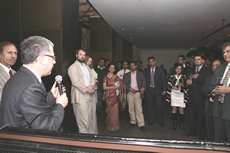|
 At
an evening function held at the Agni Bar of Hotel Park, New Delhi, attended
by over 40 people, Robert announced that Hotel Hyatt Regency had again
offered the venue this year. Hyatt is one of the 5-star hotels promoting
wine drinking culture quite aggressively. At
an evening function held at the Agni Bar of Hotel Park, New Delhi, attended
by over 40 people, Robert announced that Hotel Hyatt Regency had again
offered the venue this year. Hyatt is one of the 5-star hotels promoting
wine drinking culture quite aggressively.
Due to the still unresolved and complex issues of customs and excise
procedures, the competition will be held again in two stages, one in London
towards the end of October while the Delhi leg is expected to be completed
in November, shortly before IFE- India opens at the Pragati Maidan.
As already informed to the producers and importers who formed the bulk
of those present, the launch was also an opportunity to air their views
and comments in order to make the challenge more meaningful. ‘It
is your programme. You must participate in it fully to get maximum benefits
out of the challenge,’ remarked Robert.
Conceding that the post-challenge promotion might not have been sufficient;
delWine and Sommelier India were the only two media that had extensively
provides results etc, he nevertheless exhorted the winners to take some
action themselves.’ When Robert Parker or Wine Spectator gives ratings
or points to the wines, the producers go out themselves and blow their
trumpets. ‘We do hope to go out beyond these two profession media
and have mainstream newspapers and magazines publish and promote the results,’
he added.
Reacting to the issue of judges, he said he was perfectly satisfied with
the selection of judges at the last show, but sought the names of more
that could be added, for the consideration of the organisers. ‘If
we do not add the names you suggest, you might have a reason to complain.
We would like to keep the majority of judges as Indians, as the challenge
is meant for the Indian consumers and presumably the Indian tasters can
carry the case for the wines better.’
He was also sympathetic to a suggestion that the cost of entering samples
should be looked at. He announced that multiple entries would be given
discounts. One hopes that the organisers in London also consider the case
of lower entry costs for Indian producers, not all of whom may be cash
rich. Besides, importers entering customs duty paid wines should get some
consideration too, feels delWine.
Some entrants who did not get the awards had tended to find flaws with
the challenge. For those he had a message too.’ In the Academy awards,
not everyone gets an Oscar. The non-winners do get disappointed. There
could also be human errors. But by selecting a divers panel of judges,
we do try to minimise the problem. Again a Federer nay be a champion but
one particular day, he may not be in his best. It does not mean he is
not the champion. So I suggest you take part in as many competitions as
possible. You will discover the real competitive value of your product.’
The personal choices cannot be avoided in such competitions.’ I
would not have given an Oscar to Forrest Gump, for instance.’ Also
taking issue with the definitive point system awards, he said, “How
can you rely only on the points given by just one person? The same person,
in any case might give different points to the same wine on two different
occasions, depending upon his mood-and after all, he is only a human being.’
Taking part in more competitions is the only answer, he said with confidence.
Again, reflecting on a suggestion from Amfora Wines who felt that for
a category having smaller number of wines-say 6-7, it does not make any
sense to have 3 medals, he said, ‘theoretically, if Chateau Margaux,
Latour and Haut Brion entered a competition, it would be grossly unfair
to give a Gold to only one of them. Similarly, even if you taste a category
of 50 wines, and do not feel there was Gold medal winner, one should not
award it.’ It is pertinent that none of the Indian wines had a Gold
and there was only one silver medal out of the 35 labels entered.
One such producer Nine Hills was represented by Rukn Luthra, Business
head of Pernod Ricard, who has been associated with the project from scratch.
One of their reds had been declared the Best Red Indian wine. ‘We
are an MNC and take part in many international competitions where Robert
is involved. We are very confident of his professionalism and the way
he handles such competitions overseas. We shall be taking part in the
next IWC and any other competition that may come along as he suggests,’
said Luthra.
Dharti Desai, partner of FineWinesnMore of Mumbai, supporting the Challenge
said,’ we are a nascent industry. We must support such competitions
in order to take our industry forward.’ She said, ‘we feel
happy that our choice of wines has been liked by the judges. We shall
take part in even bigger way this year.’ They had entered 14 labels
at the first IWC, with 13 walking away with some honours.
Rewa Singh, publisher of Sommelier India, was fully supportive of the
challenge.’ There will always be some pitfalls. But we must support
and encourage such competitions,’ she said.
The launch party went well past the 8:30 hour, with people enjoying the
Buller wines provided by the importers, Pearls Wines. Chardonnay and Shiraz
were the rage and were the first ones to be polished off. Perhaps, the
delicious snacks provided by Rifaquat Ali’s team at the Agni were
finger-lickin’ good, and brought out the best in these Australian
wines!
Subhash Arora
Pics from the event will be uploaded soon-editor
|